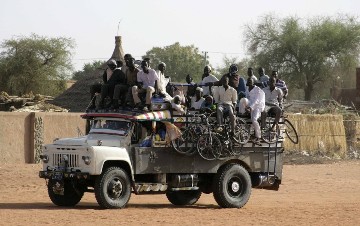Sudan army closing in on a rebel-controlled area: sources
May 4, 2013 (KHARTOUM) – The Sudan Armed Forces (SAF) has completely surrounded the district of Abu Kershola that was overrun by rebels from the Sudan Revolutionary Front (SRF) last week, well-placed sources in the South Kordofan government said.

Kauda is located 92 kilometres to the east of South Kordofan’s state capital of Kadugli.
A week ago, the SRF, which includes the Sudan People’s Liberation Movement-North (SPLM-N), along with several Darfur rebel groups, launched a major offensive most notably in Um Rawaba, the second-largest town in North Kordofan state, during coordinated attacks on several nearby areas.
In the past, the rebels’ military activity was generally confined to the Darfur region, as well as the border states of South Kordofan and Blue Nile. The only exception was in 2008 when the Darfur Justice and Equality Movement (JEM) attacked Sudan’s twin capital of Omdurman.
The Sudanese government has come under fire from citizens of Um Rawaba who accused it of negligence and leaving the area exposed. There have also been mounting calls for the defence minister, Abdel-Rahim Mohamed Hussein, to resign over his handling of the matter, even from pro-government lawmakers.
In an interview published on Saturday in pro-government al-Rayaam daily, Hussein said that the SAF was compelled to fight in South Kordofan and the Blue Nile because the SPLM-N is unwilling to agree to peace in these two areas.
The defence minister stressed that the government only resorted to war as it had no other options, pointing out that war is the last and worst stage of diplomacy.
The top military official also addressed criticisms of his performance and allegations that he remains in his post, despite numerous failures, because of his relationship with president Omer Hassan al-Bashir.
“Anyone who does not accept criticism will never be a leader”, he said.
“My relationship with the president is purely without ulterior motives, a brotherhood relationship, regardless of whether or not he was president”, Hussein added.
It’s not the first time Hussein has faced pressure to step down from his position.
In 2012, following the fall of the oil-rich town of Heglig at the hands of the South Sudanese army (SPLA), the ruling National Congress Party (NCP) bloc in parliament called on the presidency to relieve the defence minister of his duties for failing to foresee the invasion of the area which produces half of Sudan’s crude output.
Critics also note JEM’s surprise attack on the capital, which rattled the army at the time despite government forces quickly repulsing it.
It was reported that Bashir swiftly rejected calls that he sack Hussein, telling members of his party that it is a “red line”. Like Bashir, Hussein has also been indicted by the International Criminal Court (ICC) for alleged crimes in Sudan’s western Darfur region.
(ST)
